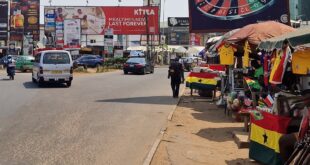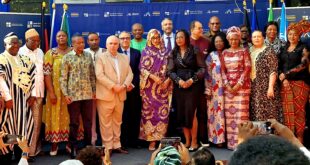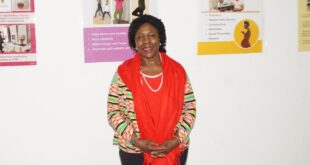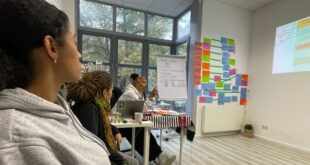On the occasion of the 30th anniversary of the Association of Black People in Germany (Initiative Schwarze Deutsche or ISD), the first and the most important group formed by the African Diaspora in this country for the improvement of their political and socio-economic status, Femi Awoniyi looks at Black people in today’s German society.
Blacks in the German society have not attained the level of social prominence that their compatriots have achieved in France or the United Kingdom, who, for historical reasons, have had a closer relationship with Africa. But the situation seems to be changing. Two Germans of African descent won seats in Germany’s Federal Parliament at the last general election in 2013. It is significant that both new legislators were elected on the platforms of the two biggest political parties, Karamba Diaby (53) on the platform of the left-of-centre Social Democratic Party or SPD and Charles Mohamed Huber (58) on that of the conservative Chancellor Angela Merkel’s Christian Democratic Union or CDU. This is undoubtedly a sign that Blacks are now politically recognised at the highest levels.
Blacks everywhere
The presence of people of African origin in the public sphere has increased significantly in the past twenty-five years. Blacks are becoming noticeable in all walks of life. In supermarkets, banks, on the streets, schools; look well and you will see a Black German!
Prominent Black figures, such as Ethiopian-born TV star Yared Dibaba, the African-American entertainer Ron Williams; the fast-talking Mola Adebisi of Viva fame and Nigerian origin; moderator Cherno Jobatey of the public TV channel ZDF, whose father hails from the Gambia; former German national team striker Gerald Asamoah, who immigrated from Ghana at the age of 12; ex-football star and TV sports commentator Tony Baffoe and his sister Liz Baffoe, of the longest running German TV soap opera Lindenstraße, who were born in Bonn to a Ghanaian father diplomat; or Roberto Blanco, of Cuban origin, who has achieved fame and recognition in Germany as an entertainer; the successful choreographer Detlef Soost (a.k.a. “Dee!”), whose father is Ghanaian; and many others today, constitute the public face of people of African ancestry in Germany and are a proof that Black Germans are no longer on the margin of society.
The list, however, is not limited to entertainers or sportsmen and media personalities. It is estimated that there are about 200 medical doctors of African origin in private practice in Germany. Not only that; many Black academics are successfully pursuing careers in universities and other institutions of higher learning in the country. And, of course, Black entrepreneurs are making their impact felt in the society as well. The symbol of Black business is the almost ubiquitous Afro Shop in major cities, dispenser of Black beauty products, African food items and other groceries, artworks and clothing.
In fact, a new book My Black Skin (2014) shows that Black success stories abound in all walks of life. Written by Dayan Kodua, the first woman of African descent to win a state beauty contest in Germany, the pictorial band portrays 25 personalities – politicians, designers, physicians, artists, chefs, lawyers, policemen and bus drivers, who tell their very personal stories of living and succeeding in Germany.
Sam Nove, cultural manager and media expert who has been living in Germany since 1975, believes that much has changed in the country and the increasing number of successful Black figures in German life serves as veritable role models for young people of African origin in the country.
“Yes, the impression is that we are also there,” said Tola Adeoye, a Nigerian-born sociologist, of the many Black people who have carved a space for themselves in the public domain. “Think of it, when you see all these people on TV or in the press, you have this feeling that we are no longer that isolated,” he added.
A century old community
Although the recorded presence of Africans in Germany dates back to 800 years, the foundation of today’s Black community was laid in the 1890s, when many Africans were brought from the continent to be trained for future service in the administration of the then German colonies – Togo, Cameroon, Southwest Africa (today’s Namibia) and Tanzania.
However, many other Africans, mainly from the German colonial territories, also came on their own to study in Germany. Many of them financed their trip by working as sailors.
Although many of these predominantly male African immigrants returned home, many others remained, married German women and formed families. Other immigrants of African origin, mainly artists and students from England and the United States, joined this group.
After World War I, Africans served in the occupying French forces that were stationed in Rhineland and many of them married local women and had children.
Nazi dictatorship forced many Black Germans to flee into exile during the Third Reich as many were subjected to inhuman punishment such as forced sterilisation. Some ended up in concentration camps.
After World War II, the occupying American troops brought new immigrants of African origin to Germany, the Black GIs. The Black community recovered and the immigration of people of African descent resumed.
In the 1960s, when most African countries became independent, Africans came to Germany mainly to study or receive training for the post-colonial development efforts of their countries.
Bilateral agreements between the government of the now defunct East Germany and some African countries (for example, Angola, Mozambique and Guinea-Bissau), from the 1960s up to 1989, also enabled young Africans to study, receive training, and work in the East German Republic to help meet severe labour shortages.
As usual, many stayed on, married and formed families.
Another form of immigration emerged as Africa’s political upheavals of the 1970s, and the economic downturns and wars of the 1980s and 1990s, forced many young people to flee their homelands to seek a better life elsewhere.
Many came to Germany to seek political asylum – either as a temporary safe haven or a chance to resettle.
Today, the community of people of African descent in Germany is made up of Africans, Afro-Germans (offspring of German-African parentage and Africans who grew up or were born in Germany), African Americans, Caribbean Blacks, Afro-Brazilians, and, lately, French and British citizens of African origin, who as European Union nationals, have come to live and work in Germany.
It is generally estimated that there are between 500,000 and 700,000 Blacks in Germany and most of them consider this country their homeland.
Challenges facing Black Germany
The career opportunities for immigrants in Germany are believed to be poorer than in France and the UK, for example. Highly-qualified Blacks still face immense hurdles to being accepted into jobs that are commensurate with their qualifications. This is a major social problem.
Adeoye agrees that there are still too many obstacles in the way of Black professionals accessing the mainstream and advocates a stronger voice for them. “Our voice is still not loud enough; we must speak up to politicians on the problems we still unfortunately face, especially regarding discrimination.”
The role of ISD
The major achievement of the ISD is, in many ways, its very existence, which encourages Black people in Germany, irrespective of their different social, cultural and racial backgrounds, to see themselves as one.
The organisation has been able to influence mainstream political actors and institutions to support its efforts against discrimination and racism.
Its protests against the demeaning depiction of Black people in the media or discriminatory public policy or action qualify the ISD as the community watchdog in German society.
The future
The Black community is here to stay. Adeoye, father of three, believes that like for other immigrants in any society, education is the path to upward mobility for Blacks in Germany. “It is very important that parents encourage their children to go as far as possible in acquiring education and training,” he added.
am Nove, originally from Ghana and the publisher of the Black German Contacts, believes the future is bright as demographic developments in the country impose a duty on the state to engage every population group in the task of national development.
Femi Awoniyi
 THE AFRICAN COURIER. Reporting Africa and its Diaspora! The African Courier is an international magazine published in Germany to report on Africa and the Diaspora African experience. The first issue of the bimonthly magazine appeared on the newsstands on 15 February 1998. The African Courier is a communication forum for European-African political, economic and cultural exchanges, and a voice for Africa in Europe.
THE AFRICAN COURIER. Reporting Africa and its Diaspora! The African Courier is an international magazine published in Germany to report on Africa and the Diaspora African experience. The first issue of the bimonthly magazine appeared on the newsstands on 15 February 1998. The African Courier is a communication forum for European-African political, economic and cultural exchanges, and a voice for Africa in Europe.













